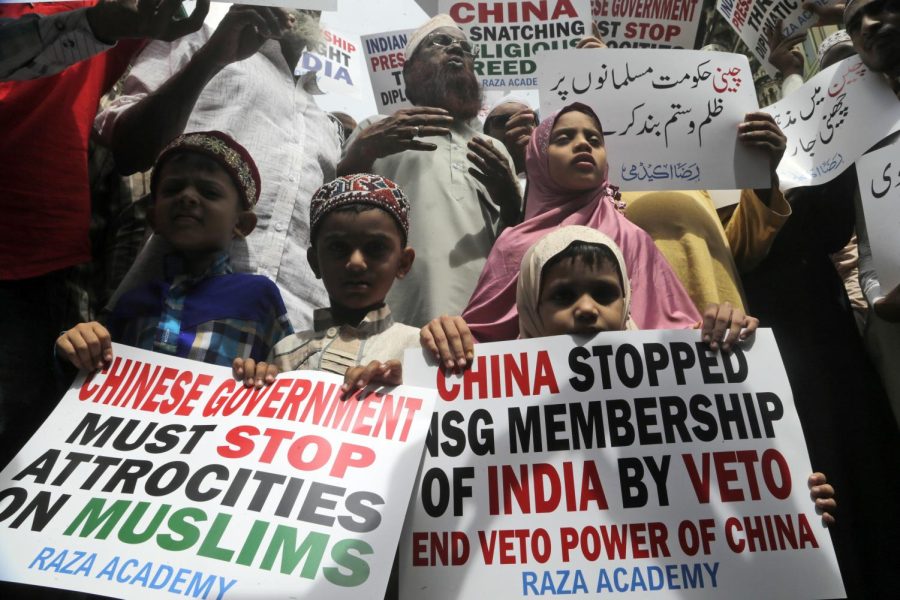Human Rights Watch accuses China of forcing Turkic Muslims into ‘internment camps’
Indian Muslims participate in a protest against the Chinese government, in Mumbai, India, Friday, Sept. 14, 2018. Nearly 150 Indian Muslims held a street protest in Mumbai, India’s financial capital, demanding that China stop detaining thousands of members of minority Uighur Muslim ethnic group in detention and political indoctrination centers in Xinjiang region. Placard reads “Chinese government must stop atrocities on Muslims.” (AP Photo/Rajanish Kakade)
China has been accused of detaining Turkic Muslims in what Human Rights Watch has referred to as “political education camps” due to their practice of Islam. The Chinese government, however, claims these facilities are “vocational education and employment training centers” for “criminals involved in minor offenses.”
The Chinese Human Rights Defenders and the Equal Rights Initiative estimate the number of those detained to be roughly 1 million.
Uyghurs, an ethnic group residing in Xinjiang, an autonomous region in northwest China, are predominantly Muslim. They are more closely related to Kazakhs, Kyrgyz and other Turkic ethnicities in central Asia than they are to Han Chinese, who make up the majority in China.
The fact that most Uyghurs practice Islam is a way China uses to justify oppressive actions. The Chinese government has engaged in similar activity against local Kazakhs, Kyrgyz and Hui, a portion of Han Chinese who also practice Islam. Ethnic Kazakhs inhabiting Northern Xinjiang have been increasingly targeted since 2016 in what the Chinese government has called the “Strike Hard Campaign,” according to Human Rights Watch.
The Strike Hard Campaign is an effort by the Chinese Government to crack down on terrorism by using “unconventional tactics” including forcing citizens living in major cities to install surveillance apps on their phones. Since 2016, the regional government has hired thousands of security personnel, according to Human Rights Watch.
Reports of these camps detail detainees’ experiences of indoctrination, suspension of individual rights to due process and allegations of torture. According to an article from The Independent, some Uyghurs have been forced to eat pork and drink alcohol, despite their religious beliefs. Detainees are also taught new laws that primarily affect Turkic Muslims. They are also forced to learn Mandarin Chinese and recite Communist Party songs, allegations which bear strong similarities to laws imposed on those outside of the camps.
“The Chinese cultural cleansing of the Uyghur population is unequivocally wrong, brutal and absolutely tyrannical,” said Ali Arif, a member of the Kent State Muslim Student Association and senior integrated life sciences major. Arif also noted a report from CNN that Uyghurs have been forced to allow Chinese government officials to live with them for up to weeks at a time called “home stays,” where they receive political education and extensive supervision.
“All Muslims, including us at Kent State, stand with our Uyghur brothers and sisters,” Arif said.
Uyghurs who have not been detained are required to attend political education meetings and flag raisings, according to Human Rights Watch. Some have been placed under house arrest or forbidden from leaving the country or city. Those outside the camps are also unable to contact friends and family who have been detained.
The Chinese government also monitors social media of citizens abroad, said a source native to China who wished to remain anonymous.
One explanation for these detentions is that the Chinese government is attempting to consolidate power in the region, said Alex Colucci, a Kent State graduate student who wrote his master’s thesis on how the Chinese government has subjected Uyghurs to “governmental norms.”
Xinjiang is an autonomous region, meaning it has its own regional government, but also more legislative powers than other provinces. The Chinese government has been trying to incentivise its eastern population, primarily Han Chinese, to move west, Colucci said.
In Urumqi, the administrative capital of Xinjiang, Han Chinese outnumber the local Uyghur population by 62 percent. This is due in part to the “Silk Road Economic Belt and the 21st-century Maritime Silk Road,” more frequently referred to as the Belt and Road Initiative (BRI).
The BRI is an attempt by the Chinese government to consolidate economic power in Asia by establishing new trade routes over land and sea. China has been investing billions of dollars in infrastructure in African and Central Asian countries. The “Belt” refers to routes to export goods over land. One of these routes runs through the Wakhjir Pass, the only pass between Afghanistan and China, which spills into the Chalachigu Valley in Southwestern Xinjiang. The “Road” is an effort by China to build and subsequently lease seaports in countries in the Indian Ocean.
Xinjiang also has the largest fossil fuel reserves of any region in China, according to POWER magazine. This abundance of natural resources and the Chinese government’s effort to make the region accommodate the BRI have given the government the goal of consolidating power over the region.
“More than anything else that’s happened in Xinjiang since the ‘90s, (reeducation camps) have been the most attention I’ve seen given to Uyghurs in Western media,” Colucci said.
The Chinese government cracked down on anti-Communist Party riots in the late 2000s and expanded their surveillance.
“They barely made a dent in Western news at the time,” Colucci said.
Colucci also mentioned the impact the War on Terror has had on Uyghurs.
“When PRC (People’s Republic of China) officials were addressing the U.N. in the months leading up to 9/11, the discourse toward Uyghurs was calling them criminals engaging in criminal activity,” Colucci said. “A week or two after 9/11, the discourse changed from crime to terrorism. They described the same criminal incidents as terror incidents. (The PRC is) using the geopolitical context of the War on Terror to justify practices like suppressing riots, freedom of religion and freedom of speech, and it’s the larger justification for putting them in re-education camps.”
Kent State’s Office of Global Education in Beijing did not respond to a request for comment.
David Williams is a general assignment reporter. Contact him at [email protected].



